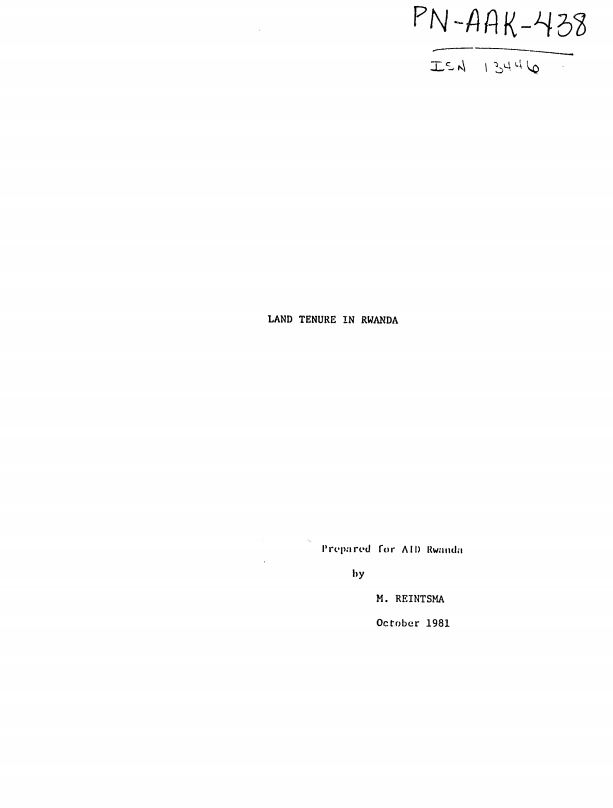The LAND Project is a five year program supported by the United States Agency for International Development (USAID). Its primary goal is strengthening the resilience of Rwandan citizens, communities and institutions and their ability to adapt to land-related economic, environmental and social changes.
Resilience is defined as “the ability to withstand or recover from difficult conditions.” It also comprises the ability of human and ecological systems to recover from shocks or difficult changes, and to transform to a better condition by responding flexibly and creatively to stress factors. In Rwanda, land tends to be one of the primary assets citizens rely on to buffer against difficult conditions and rapid change.
The project’s central objectives are twofold:
1.Increased capacity of local Rwandan institutions to generate high quality, evidence-based research on land-related issues that can be used by the Government, civil society organizations, and Rwandan citizens.
2. Increased understanding of land laws, policies, regulations, and legal judgments on land-related issues by GOR officials, local civil society organizations, research institutes and citizens.
Key outcomes of the project include:
- Holding annual National Land Research Agenda workshops to establish the research priorities of land sector stakeholders that the LAND Project will support. These workshops bring together multiple stakeholders from government, civil society and the research community;
- Supporting research on land-related issues through competitive awards to Rwandan research institutions, universities, and civil society organizations, and providing tailored capacity building assistance to improve research and advocacy capabilities;
- Offering training and other support to legal assistance providers to enhance their capacity to support women and vulnerable populations in understanding and realizing their land rights;
- Training local land authorities on the implementation of the land law and regulations.
- Carrying out research on critical land issues, including gendered land rights in practice, community rights to resources in and around protected areas, and expropriation.
- Managing a land-focused website to improve research, communications, and policy advocacy efforts that are focused on land, and to act as a vehicle for enhancing collaboration between actors working in the land sector;
- Providing organizational development support to civil society organizations supporting women’s land rights.
- Supporting innovative and coordinated communications approaches by civil society and government that enhance the knowledge of Rwandan citizens about research findings and their land rights.
Because the LAND Project is a five year endeavor, we are seeking an institution that has the interest, capacity, skills and resources to eventually take over hosting and maintenance of the website, ensuring it stays up-to-date and relevant to the land sector stakeholder community. If your organization is potentially interested in assuming management of this site, please contact us and tell us why you believe your institution would be an ideal candidate.
Members:
Resources
Displaying 146 - 149 of 149The economics of farm fragmentation: evidence from Ghana and Rwanda
Farm fragmentation, in which a household operates more than one separate parcel of land, is a common phenomenon in Sub-Saharan Africa. Concerned by the perceived costs of fragmented as opposed to consolidated holdings, several countries have implemented land consolidation programs. But these interventions overlook the benefits that land fragmentation can offer farmers in managing risk, in overcoming seasonal labor bottlenecks, and in better matching soil types with necessary food crops.
Indigenous Land Rights Systems in Sub-Saharan Africa: A Constraint on Productivity?
This article uses cross-sectional evidence from Ghana, Kenya, and Rwanda in 1987–88 to examine the question, Are indigenous land rights systems in Sub-Saharan Africa a constraint on productivity? The evidence supports the hypothesis suggested by historical studies, that African indigenous land rights systems have spontaneously evolved from systems of communal control towards individualized rights in response to increases in commercialization and population pressure.
Land Use, Soil Loss and Sustainable Agriculture in Rwanda
The conservation of scarce land resources is essential to the long-term viability of agriculture in Rwanda. High population density, steep slopes, and abundant rainfall prevail in the highland portions of this African country, making the task of erosion control uncommonly difficult for the peasant farmer. The specific use to which land is put, e.g., cultivation, fallow, pasture, woodlots, and, if it is cultivated, the particular combination of crops grown, can be seen as contributing to both the cause and the solution of the land degradation problem.
Land Tenure in Rwanda
In a country with the highest population density of all Africa, and 95% of this population dependent on land, the question of land tenure is inevitably a vital issue. In Rwanda it is becoming even more crucial as marginal lands are cultivated, and competition for land, and thus a livelihood, increases. The currently prevailing land tenure systems in Rwanda vary from one area of the country to another, reflecting both differences in traditional customary laws, and the adoption, at varying degrees in different regions, of written law in place of customary law.



